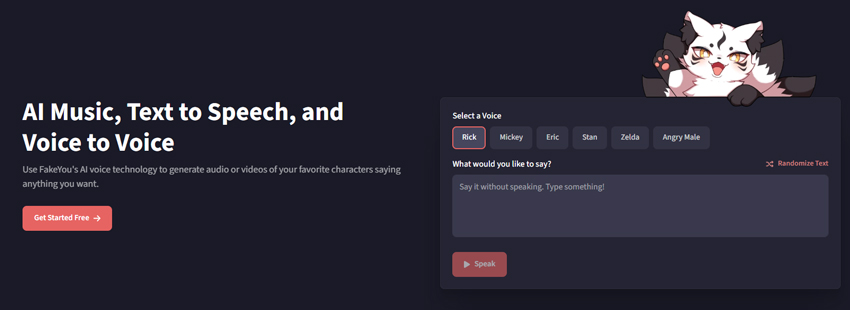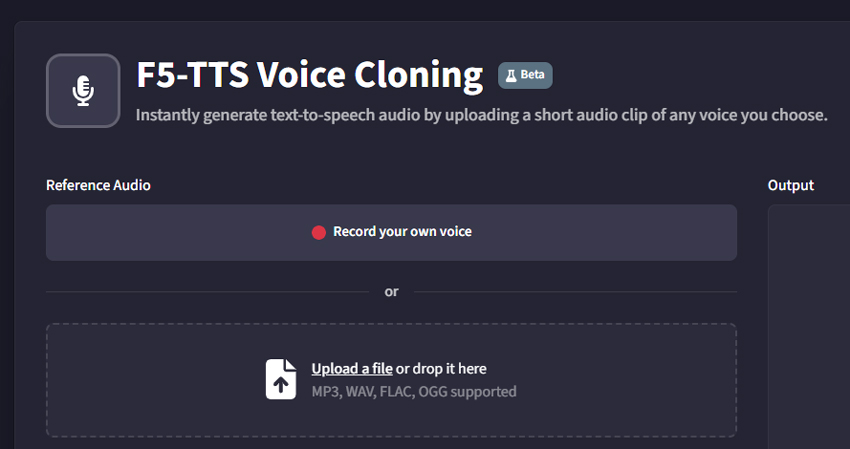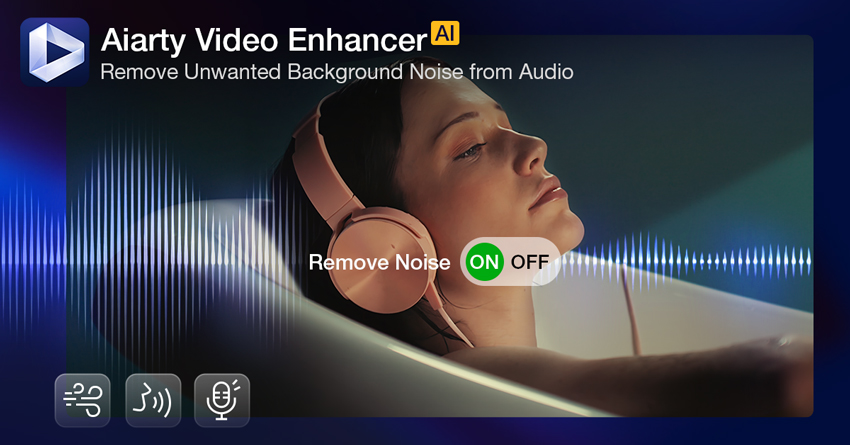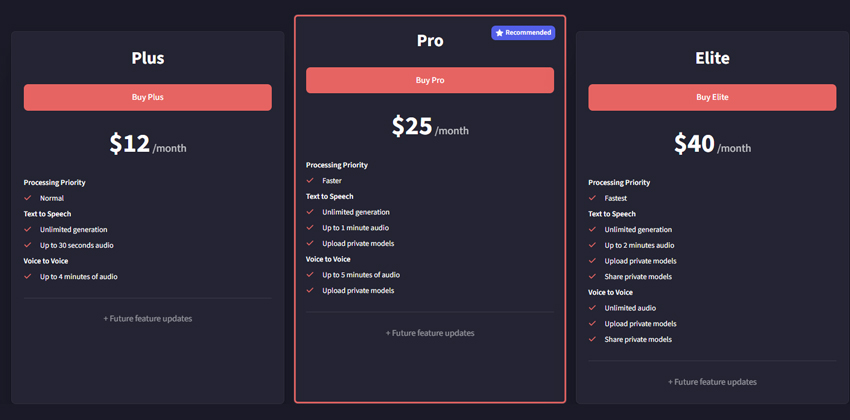If you’ve ever wanted your favorite characters, celebrities, or fictional icons to speak lines in their own voices, FakeYou AI is the tool for the job. It is easy to use, surprisingly fun, and capable of producing realistic voiceovers in just a few clicks. FakeYou AI has become popular with content creators, meme enthusiasts, and voiceover artists who want to generate audio or lip-synced videos without expensive equipment or studio setups. In this review, I’ll explain what FakeYou AI is, show what it can do, and evaluate its performance in real-world use so you can decide if it fits your creative projects.
What is FakeYou AI
FakeYou AI is an online text-to-speech and voice cloning platform that lets users generate audio clips using thousands of voices—from popular cartoon characters to real-world celebrities. It’s built on advanced AI speech synthesis models that mimic real vocal tones, accents, and expressions. You can simply type your text, choose a voice model, and generate speech in seconds.

Beyond standard text-to-speech, FakeYou also offers voice-to-voice conversion, custom voice cloning, and even video lip-syncing. That means you can make a video where a character actually moves their lips to match your generated voice line—an impressive feature for memes, dubbing, or short-form videos.
Is FakeYou Free?
Yes, FakeYou AI is free to use for basic features. You can instantly access its TTS and voice conversion tools without paying. However, free users may experience slower queue times during high traffic and limited generation lengths.
For faster processing, priority access, and longer audio generation, FakeYou offers paid subscription tiers. These plans are designed for creators who need frequent or commercial-grade voice synthesis.
Is FakeYou Legal?
FakeYou operates in a gray area when it comes to voice cloning. The platform states that its models are fan-made and intended for parody, education, or entertainment, not impersonation or defamation. Still, users should be cautious when cloning real people’s voices or using celebrity voice models in commercial projects.
As long as your use remains non-commercial and creative, FakeYou AI is considered safe and legal for personal content. Always respect copyright and personality rights before sharing generated media publicly.
FakeYou AI Features & Specs
After exploring FakeYou AI for a while, I found that the platform offers a lot more than just basic text-to-speech. It’s designed to make voice generation easy, creative, and accessible for anyone, no matter their technical background. Below are the main features that stood out to me during testing.
1. Massive Voice Library
The voice library is what makes FakeYou truly unique. It includes thousands of voices contributed by users, covering everything from movie stars and cartoon characters to anime figures and famous YouTubers. The variety is huge, and while the sound quality can differ from one model to another, many of them are impressively accurate. I liked how easy it is to search for voices or filter by category. You can even preview a model before using it, which saves time.
2. Text-to-Speech Generation
This is the core of FakeYou. You simply type your text, pick a voice, and let the AI generate speech. It takes only a few seconds to produce an audio clip, and you can replay or download it right away in MP3 or WAV format. I’ve used it for short video intros and memes, and it works smoothly. The platform handles simple sentences best; longer texts may take more time or lose some expression, but for most projects, it’s perfectly fine.

3. Voice-to-Voice Conversion
One of the more interesting features is the ability to transform your own recorded voice into another one from the library. You upload a short audio clip, choose a target voice, and the system processes it to match the tone and style. It’s not always flawless, but when it works well, it’s surprisingly fun to hear your words spoken in a completely different voice.

4. Voice Cloning
FakeYou also allows users to create or request custom voice models. This is where the community aspect shines. Some advanced users contribute cloned voices that mimic real or fictional characters, while others train new models for specific styles. You can submit requests if a voice you want isn’t available yet, and active contributors often respond. It adds a sense of collaboration that’s rare among AI voice tools.

5. Video Lip Sync
FakeYou extends beyond just audio. It includes a video lip sync feature that matches the generated speech with lip movements on video clips. It’s still somewhat experimental but works decently for short animations or meme-style videos. I tested it with a few sample clips, and while not perfect, it’s impressive to see an online tool attempt full audio-visual sync.
6. Web-Based Convenience
Everything runs directly in your browser. There’s no installation, no heavy system requirements, and it works well on both desktop and mobile. I found it especially handy for quick projects where I just needed a short line of dialogue without opening a full editing program.
7. Community & Sharing
The FakeYou community keeps the platform alive. Users share voices, rate them, and help refine the quality of existing ones. You can browse trending voices, view top creators, and even contribute your own models if you’re into AI training. It’s more of a creative playground than a standard voice generator site.
FakeYou AI Pros & Cons
After using FakeYou AI for a while, I’ve noticed several strengths and a few limitations that are important to know before diving in.
- Massive voice library: Thousands of community-submitted voices, including celebrities, cartoon characters, anime, and game icons.
- Easy to use: No installation or technical setup; generate speech in a few clicks.
- Fun and creative: Perfect for memes, short videos, and playful experiments.
- Free tier available: Most features are accessible without paying.
- Community-driven: Users contribute new voices and models, keeping the library fresh.
- Additional features: Supports voice-to-voice conversion, custom voice cloning, and video lip-sync.
- Strong English voice quality: Popular celebrity and character voices often sound convincing and capture recognizable personality traits.
- Variable quality: Some voices are robotic or inconsistent, especially longer clips.
- Pronunciation issues: Complex words, technical terms, or foreign names may be mispronounced.
- Limited customization: No control over pitch, tone, or emotion.
- Free plan restrictions: Slower queue times and shorter clip lengths during peak hours.
- Not studio-grade: Output is fun but not suitable for professional voiceovers.
- Legal considerations: Celebrity or character voices may raise copyright or personality rights issues.
- Language limitations: Most voices are in English, with only a few in Spanish, French, German, and very limited Italian or Portuguese. Global content creators may find this restrictive.
- Lower-quality voices: Lesser-known models can sound outdated or broken, resembling early text-to-speech systems. Mispronunciations require regenerating the clip entirely.
Overall, FakeYou AI is excellent for creative, casual projects and experimentation but not ideal for professional or multilingual production.
If you want your AI-generated voices or video audio to sound crystal clear, Aiarty Video Enhancer is a game-changer. Its audio denoise feature instantly removes background noise, hiss, and unwanted static, making every clip sound polished and professional. Whether you’re using FakeYou AI voices for memes, short videos, or storytelling, Aiarty ensures your audio shines with clarity. The process is fast, simple, and doesn’t require any technical expertise—just upload your audio, run the denoise tool, and get clean, studio-quality sound ready for your projects. For anyone looking to take AI-generated or recorded audio to the next level, Aiarty Video Enhancer is a must-have companion.

FakeYou AI Pricing
FakeYou AI offers both free and paid plans, giving users flexibility depending on how often and extensively they want to use the platform.

Free Plan
- Access to most voices in the library.
- Generate short audio clips with standard queue priority.
- Great for experimenting, creating memes, or trying out the platform before upgrading.
Paid Plans
Plus – $12 /month
- Processing Priority: Normal
- Text-to-Speech: Unlimited generation, up to 30 seconds per clip
- Voice-to-Voice: Up to 4 minutes of audio
- Access to future feature updates
Pro – $25 /month
- Processing Priority: Faster
- Text-to-Speech: Unlimited generation, up to 1 minute per clip
- Voice-to-Voice: Up to 5 minutes of audio
- Upload private models
- Access to future feature updates
Elite – $40 /month
- Processing Priority: Fastest
- Text-to-Speech: Unlimited generation, up to 2 minutes per clip
- Voice-to-Voice: Unlimited audio
- Upload and share private models
- Access to future feature updates
Finding the Right Plan for You
The free plan is sufficient for casual users, meme creators, and anyone experimenting with AI voices. Paid tiers work best for frequent users who need longer clips, faster processing, or the ability to upload and share private voice models. Choosing the right plan depends on how often you generate audio and how important queue priority and clip length are to your workflow.
Best FakeYou AI Alternatives
While FakeYou AI is fun and versatile, it’s not the only AI voice tool on the market. Depending on your needs, these alternatives might be worth exploring:
- Uberduck AI: Very similar to FakeYou, Uberduck offers a large community-driven library of voices, including celebrity impressions and character models. It also supports text-to-speech and some voice-cloning features, making it a strong alternative for casual creators.
- Respeecher: A professional-grade voice cloning tool aimed at studios and content creators who need highly realistic voices. Unlike FakeYou, Respeecher focuses on quality and consistency, with support for commercial projects.
- Lovo.ai: This platform provides studio-quality neural voices and is particularly strong for narration, e-learning, and marketing content. It offers multiple languages and fine-tuning options that FakeYou lacks.
- Play.ht: Known for natural-sounding voices and multi-language support, Play.ht is ideal for podcasters, marketers, and businesses needing realistic TTS output.
- Murf.ai: Another professional option, Murf.ai combines text-to-speech with voice editing tools, multiple languages, and commercial licensing, making it suitable for business and media production.
Each of these alternatives brings unique advantages. If your priority is creative fun and community-driven voices, FakeYou remains a great choice. If you need professional-quality audio, multilingual support, or advanced customization, one of these platforms may be a better fit.
FakeYou AI vs Competitors
Final Verdict
After testing FakeYou AI extensively, it’s clear that the platform excels as a creative and accessible AI voice tool. Its huge community-driven voice library, simple interface, and standout features like voice-to-voice conversion and video lip-sync make it a favorite for casual creators, meme makers, and hobbyists looking to add personality to their projects.
That said, it has its limitations. Voice quality can vary, particularly with lesser-known models, and language support is mostly restricted to English. There’s no fine-grained control over pitch, tone, or emotion, which can make it less ideal for professional or commercial voiceover work.
For anyone experimenting, producing short videos, or creating entertaining AI-generated audio, FakeYou AI provides excellent value, especially with the free plan. Users who need longer clips, faster processing, or more advanced voice management will find the paid plans helpful or may prefer professional alternatives like Respeecher or Lovo.ai.
In short, FakeYou AI is a fun, reliable, and versatile tool that brings creativity and entertainment to AI-generated voices, making it perfect for personal projects and casual content creation.